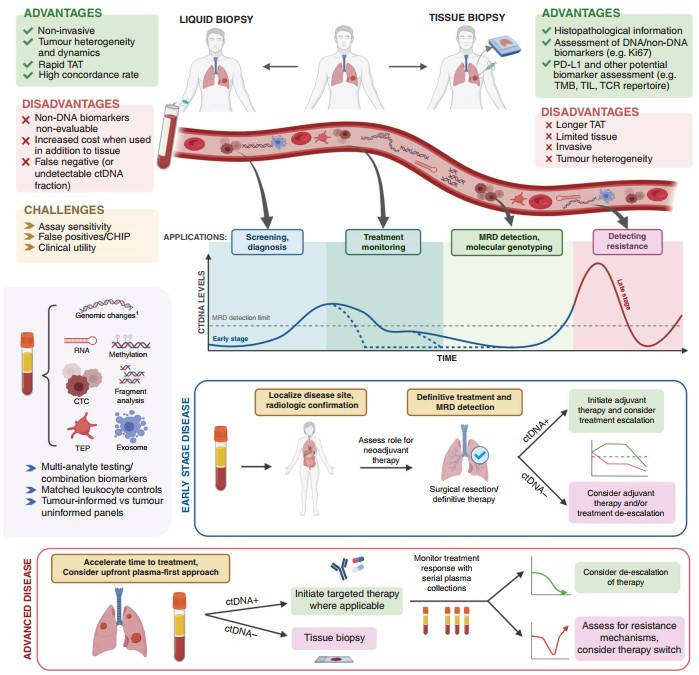Exosomal cfDNA Isolation and Profiling Service
Overview Services Features FAQs
Overview
Exosomes are membrane vesicles secreted into extracellular matrix by most types of cells. These vesicles perform many biological functions especially in cell-cell communication, and it is found that their internal entities, like proteins and nuclear acids, are closely correlated with the pathogenesis of many human malignancies. This provides a commanding promotion and growing demands for simple, efficient, and affordable technologies to isolate exosomes and their contents.
Creative Biolabs is an expert institution and reliable supplier in the world that has successfully accomplished quantities of one-step, customized services for clients as required. Capitalizing on the biochemical and physicochemical properties of exosomes, we have developed a number of techniques for the isolation and profiling of exosomes, including cell-free DNA (cfDNA) isolation in exosomes.
Exosome Synopsis
Exosomes are small vesicles comprised of a lipid bilayer containing various proteins, RNAs, and bioactive lipids. This characteristic lipid bilayer has an average thickness of about 5 nm and the lipid components of exosomes include ceramide, sphingolipids, cholesterol, and phosphoglycerides with long, saturated fatty-acyl chains. The outer surface of exosomes has rich saccharide chains, such as mannose, polylactosamine, N-linked glycans, and alpha-2,6 sialic acid. In addition to great interest of proteins on the surface and in the core of exosomes, other key cargos that exosomes carry are nucleic acids including deoxynucleic acids (DNA), coding and non-coding ribonucleic acid (RNA). These nucleic acids are frequently needed to be accurately quantified after exosomes have been isolated because their profiles meticulously reflect diverse kinds of diseases and medical conditions.
cfDNA
cfDNA is one type of nucleic acids first detected in the bloodstream, that can circulate freely from cells. Multiple properties of cfDNA are thought to arise from died cells with contents released into the blood, which may suggest cell death as its major origin. And the cells involve the breakdown or death of pathogens, normal and abnormal cells. In the blood, most of the cfDNA is double-stranded, highly fragmented, and has a size range of approximately 150 bp. This matches the length of DNA occupied by a nucleosome, which is the primary unit for spatial organization of DNA in the nucleus. Cumulative evidence has shown an increase of cfDNA in cancer patients and many other disease states. Thereby, recent research is being conducted to determine if cfDNA can be used for the diagnosis of some cancer-related diseases and for tracking genetic alterations that guide therapeutic strategies.
 Fig.1 Opportunities and challenges of ctDNA in cancer.1,2
Fig.1 Opportunities and challenges of ctDNA in cancer.1,2
Services
Exosomal cfDNA Isolation Service in Creative Biolabs
The rapid pace to understand exosomes and their biological functions have been offering fundamentally new insights into the physiological roles that exosomes play as well as their predominant relevance to human health. It is demonstrated that cfDNA in exosomes is elevated in a number of diseases, even cancer cases. However, for metastatic diseases, circulating tumor DNA reaches an amount less than 0.1 percent of the total cfDNA content in the blood. Consequently, cfDNA is being considered to be used for the diagnosis of various cancer linked diseases and provides an approach to find novel treatments.
The isolation and profiling of cfDNA in exosomes have become a major part of both fundamental research and clinical applications. In Creative Biolabs, we would like to introduce various exosome and exosomal cfDNA isolation techniques based on diverse mechanisms and typical workflows, and provide professional analysis supports throughout the client's study process.
Features
The high-end services devised by Creative Biolabs have the potential to detect unique insights towards improving human health and facilitating academic investigations. Our one-step, high-quality customized services show a number of advantages as below.
-
Fast and efficient
-
One-stop pipeline
-
Skillful staff and advanced platforms
-
Best supports on pre- and after-sales
If you have any question, please feel free to contact us for more information.
FAQs
Q: What types of samples can be received?
A: We accept exosome samples derived from serum or plasma, as these exosomes may contain cfDNA, which can be used to study disease biomarkers.
Q: How much exosome sample should I provide?
A: Exosome samples are generally quantified using NTA or BCA methods. Please inform us of your quantification results and research purposes, and our professional customer service team will evaluate the volume of sample you need to provide. Alternatively, you can directly provide serum or plasma, and we will handle the exosome isolation and quantification.
References
-
García-Pardo, M.; et al. Integrating circulating-free DNA (cfDNA) analysis into clinical practice: opportunities and challenges. British Journal of Cancer. 2022, 127(4):592-602.
-
Distributed under Open Access license CC BY 4.0, without modification.
For Research Use Only. Cannot be used by patients.
Related Services:

 Fig.1 Opportunities and challenges of ctDNA in cancer.1,2
Fig.1 Opportunities and challenges of ctDNA in cancer.1,2









